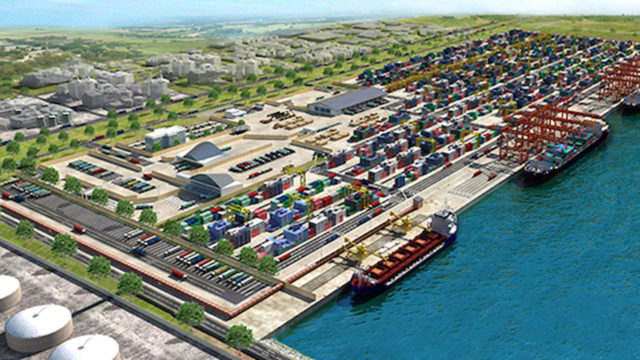
Findings by Shipping Position Daily have revealed that the Lekki Deep Seaport has berthed 12 vessels and handled a total cargo volume of 3561 Total Equivalent Units (TEUs) between April when it began full commercial operations and June 2023.
The port also facilitated 407 TEUs in unit transshipment volume during the same period. This is according to statistics made available to our correspondent by Bolaji Abimbola, an official of Indigo Agency, media consultants to Lekki Deep Seaport.
He informed that the berthing of 12 vessels with an average length overall (LOA) of 265 meters showcased the port’s capability to handle large vessels effectively.
He said the port also recorded success with the recent transshipment involving the inbound vessel CMA CGM Rimbaud and the outbound vessel GSL Alice which has set the stage for further growth.
While further stating that Lekki Port, along with the container terminal operator, has worked collaboratively with the Nigerian Ports Authority and the Federal Ministry of Transportation to develop transshipment guidelines. He said the cooperation has instilled confidence in all parties, propelling them to seek increased cargo volumes.
However, despite the volume recorded, stakeholders have called for enhanced enlightenment to boost the port’s traffic. Frank Obiekezie, the National Secretary of the Association of Registered Freight Forwarders of Nigeria (AREFFN), emphasized the need for more awareness among importers and agents. He revealed that most agents have offices in Apapa and its vicinity, making them accustomed to the ports there.
He said cost considerations, particularly transportation expenses, are also influencing importers’ decisions that have further impacted cargo routing to Lekki Port. He urged the Lekki port management to come up with a comprehensive planning to mitigate potential congestion issues at the port, noting that building trust and confidence among importers and agents will be instrumental in encouraging more cargo traffic to shift towards the Lekki port.
He explained that: “To start with, it’s just a new project coming on board, the decision to route a cargo is the decision of the importer on the advice of his agent; most of the time. Now, most agents and importers have been so used to Apapa and Tincan ports, and most agents have their offices in Apapa and its environs. You know the situation in this country now.
“What does it cost an agent? Have you taken a commercial vehicle to Lekki? If you do that, you will see that it is not viable for an agent to advise the importer to route his consignment to Lekki port. Most people will be waiting to see whether the operation there will be cheaper overall, because if they lower their cost this might help importers to route their cargoes there.
“When you factor in, the cost of transportation to wherever you are taking the consignment to, you will be able to see if it’s cheaper. So, it will be difficult to convince agents to send their importers to move cargo through the Lekki port” he said.
Speaking also, a shipper; Uzor Agbonya commended efforts made by the Lekki Deep Seaport in attracting vessels and handling cargo volumes. He also highlighted the importance of fostering a competitive environment among Nigerian ports to achieve balanced growth in the maritime sector.
Uzor stressed the significance of effective collaboration between the Lekki port authorities and relevant government agencies to address the challenges faced in diverting cargo traffic to the new port. She emphasized that enhancing the ease of doing business, reducing logistics costs, and optimizing operational efficiency are essential factors that will attract more importers and shipping lines to consider Lekki as a preferred port of entry.















